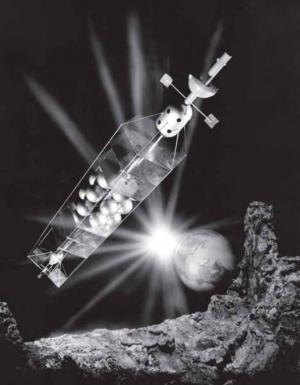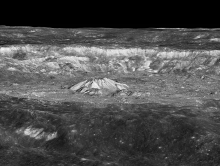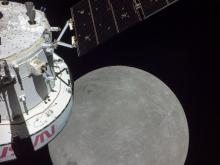This 1959 artist's concept shows a nuclear-powered spacecraft flying past the Moon. NASA and other agencies worked on nuclear rockets for decades. The space agency even operated its own nuclear reactor, in Ohio, as part of its test program. Budget cuts in the early 1970s doomed both the reactor and nuclear rockets. NASA has been conducted new research on nuclear rockets in recent years, though. [NASA]
You are here
Plum Brook
JFK: I believe that this nation should commit itself to achieving the goal, before this decade is out, of landing a man on the Moon and returning him safely to the Earth.
John F. Kennedy set that goal in a speech to Congress in May 1961. It led to the first lunar landing eight years later. Kennedy also asked Congress to support an even “spacier” goal: developing a nuclear rocket.
JFK: This gives promise of someday providing a means for even more-exciting and ambitious exploration of space — perhaps beyond the Moon — perhaps to the very end of the solar system itself.
NASA was already developing one of the tools it needed to build such a rocket: a nuclear reactor. The device produced its first sustained reactions 60 years ago today.
The reactor was at Plum Brook Station, near Sandusky, Ohio. Its original mission was to support development of nuclear-powered aircraft. It switched to rockets just days after Kennedy’s speech.
NASA eventually built and tested engines on the ground. And by the early 1970s, it was about ready to build an engine to test in space. But then its budget was slashed. Nuclear rockets were cancelled — and so was the Plum Brook reactor.
NASA considered plans for re-opening the facility, but nothing ever came of them. The last bits of the reactor site were cleared away in 2012. Today, though, NASA is poring over the old files as it once again considers building nuclear-powered rockets.
Script by Damond Benningfield
Get Premium Audio
Listen to today's episode of StarDate on the web the same day it airs in high-quality streaming audio without any extra ads or announcements. Choose a $8 one-month pass, or listen every day for a year for just $30.







